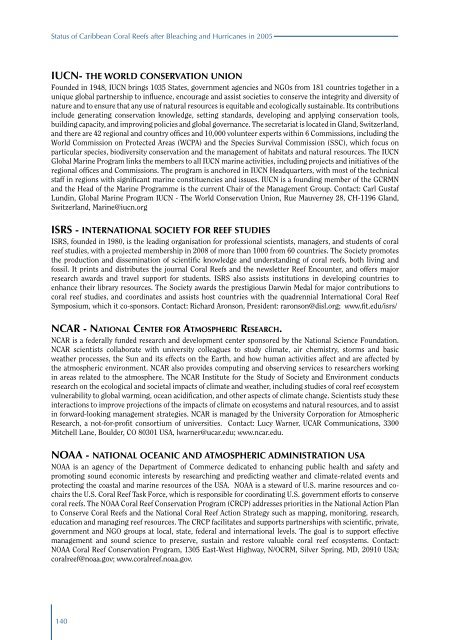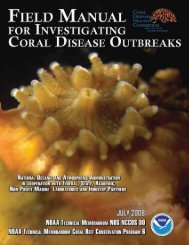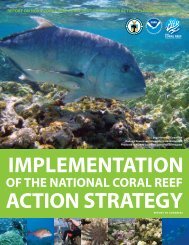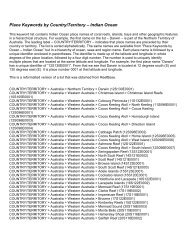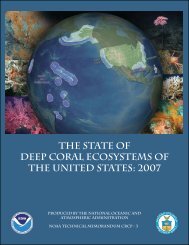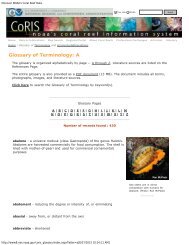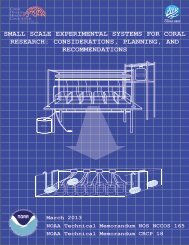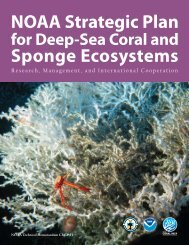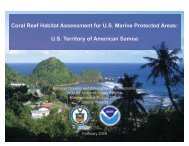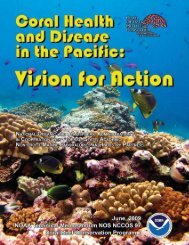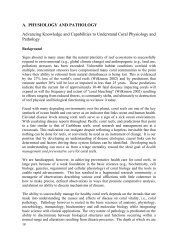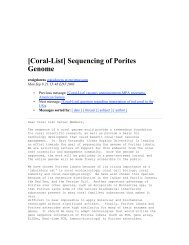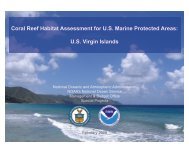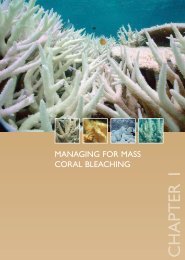Status of Caribbean coral reefs after bleaching and hurricanes in 2005
Status of Caribbean coral reefs after bleaching and hurricanes in 2005
Status of Caribbean coral reefs after bleaching and hurricanes in 2005
Create successful ePaper yourself
Turn your PDF publications into a flip-book with our unique Google optimized e-Paper software.
<strong>Status</strong> <strong>of</strong> <strong>Caribbean</strong> Coral Reefs <strong>after</strong> Bleach<strong>in</strong>g <strong>and</strong> Hurricanes <strong>in</strong> <strong>2005</strong>IUCN- THE WORLD CONSERVATION UNIONFounded <strong>in</strong> 1948, IUCN br<strong>in</strong>gs 1035 States, government agencies <strong>and</strong> NGOs from 181 countries together <strong>in</strong> aunique global partnership to <strong>in</strong>fluence, encourage <strong>and</strong> assist societies to conserve the <strong>in</strong>tegrity <strong>and</strong> diversity <strong>of</strong>nature <strong>and</strong> to ensure that any use <strong>of</strong> natural resources is equitable <strong>and</strong> ecologically susta<strong>in</strong>able. Its contributions<strong>in</strong>clude generat<strong>in</strong>g conservation knowledge, sett<strong>in</strong>g st<strong>and</strong>ards, develop<strong>in</strong>g <strong>and</strong> apply<strong>in</strong>g conservation tools,build<strong>in</strong>g capacity, <strong>and</strong> improv<strong>in</strong>g policies <strong>and</strong> global governance. The secretariat is located <strong>in</strong> Gl<strong>and</strong>, Switzerl<strong>and</strong>,<strong>and</strong> there are 42 regional <strong>and</strong> country <strong>of</strong>fices <strong>and</strong> 10,000 volunteer experts with<strong>in</strong> 6 Commissions, <strong>in</strong>clud<strong>in</strong>g theWorld Commission on Protected Areas (WCPA) <strong>and</strong> the Species Survival Commission (SSC), which focus onparticular species, biodiversity conservation <strong>and</strong> the management <strong>of</strong> habitats <strong>and</strong> natural resources. The IUCNGlobal Mar<strong>in</strong>e Program l<strong>in</strong>ks the members to all IUCN mar<strong>in</strong>e activities, <strong>in</strong>clud<strong>in</strong>g projects <strong>and</strong> <strong>in</strong>itiatives <strong>of</strong> theregional <strong>of</strong>fices <strong>and</strong> Commissions. The program is anchored <strong>in</strong> IUCN Headquarters, with most <strong>of</strong> the technicalstaff <strong>in</strong> regions with significant mar<strong>in</strong>e constituencies <strong>and</strong> issues. IUCN is a found<strong>in</strong>g member <strong>of</strong> the GCRMN<strong>and</strong> the Head <strong>of</strong> the Mar<strong>in</strong>e Programme is the current Chair <strong>of</strong> the Management Group. Contact: Carl GustafLund<strong>in</strong>, Global Mar<strong>in</strong>e Program IUCN - The World Conservation Union, Rue Mauverney 28, CH-1196 Gl<strong>and</strong>,Switzerl<strong>and</strong>, Mar<strong>in</strong>e@iucn.orgISRS - INTERNATIONAL SOCIETY FOR REEF STUDIESISRS, founded <strong>in</strong> 1980, is the lead<strong>in</strong>g organisation for pr<strong>of</strong>essional scientists, managers, <strong>and</strong> students <strong>of</strong> <strong>coral</strong>reef studies, with a projected membership <strong>in</strong> 2008 <strong>of</strong> more than 1000 from 60 countries. The Society promotesthe production <strong>and</strong> dissem<strong>in</strong>ation <strong>of</strong> scientific knowledge <strong>and</strong> underst<strong>and</strong><strong>in</strong>g <strong>of</strong> <strong>coral</strong> <strong>reefs</strong>, both liv<strong>in</strong>g <strong>and</strong>fossil. It pr<strong>in</strong>ts <strong>and</strong> distributes the journal Coral Reefs <strong>and</strong> the newsletter Reef Encounter, <strong>and</strong> <strong>of</strong>fers majorresearch awards <strong>and</strong> travel support for students. ISRS also assists <strong>in</strong>stitutions <strong>in</strong> develop<strong>in</strong>g countries toenhance their library resources. The Society awards the prestigious Darw<strong>in</strong> Medal for major contributions to<strong>coral</strong> reef studies, <strong>and</strong> coord<strong>in</strong>ates <strong>and</strong> assists host countries with the quadrennial International Coral ReefSymposium, which it co-sponsors. Contact: Richard Aronson, President: raronson@disl.org; www.fit.edu/isrs/NCAR - Nat i o na l Center f o r Atmospheric Research.NCAR is a federally funded research <strong>and</strong> development center sponsored by the National Science Foundation.NCAR scientists collaborate with university colleagues to study climate, air chemistry, storms <strong>and</strong> basicweather processes, the Sun <strong>and</strong> its effects on the Earth, <strong>and</strong> how human activities affect <strong>and</strong> are affected bythe atmospheric environment. NCAR also provides comput<strong>in</strong>g <strong>and</strong> observ<strong>in</strong>g services to researchers work<strong>in</strong>g<strong>in</strong> areas related to the atmosphere. The NCAR Institute for the Study <strong>of</strong> Society <strong>and</strong> Environment conductsresearch on the ecological <strong>and</strong> societal impacts <strong>of</strong> climate <strong>and</strong> weather, <strong>in</strong>clud<strong>in</strong>g studies <strong>of</strong> <strong>coral</strong> reef ecosystemvulnerability to global warm<strong>in</strong>g, ocean acidification, <strong>and</strong> other aspects <strong>of</strong> climate change. Scientists study these<strong>in</strong>teractions to improve projections <strong>of</strong> the impacts <strong>of</strong> climate on ecosystems <strong>and</strong> natural resources, <strong>and</strong> to assist<strong>in</strong> forward-look<strong>in</strong>g management strategies. NCAR is managed by the University Corporation for AtmosphericResearch, a not-for-pr<strong>of</strong>it consortium <strong>of</strong> universities. Contact: Lucy Warner, UCAR Communications, 3300Mitchell Lane, Boulder, CO 80301 USA, lwarner@ucar.edu; www.ncar.edu.NOAA - NATIONAL OCEANIC AND ATMOSPHERIC ADMINISTRATION USANOAA is an agency <strong>of</strong> the Department <strong>of</strong> Commerce dedicated to enhanc<strong>in</strong>g public health <strong>and</strong> safety <strong>and</strong>promot<strong>in</strong>g sound economic <strong>in</strong>terests by research<strong>in</strong>g <strong>and</strong> predict<strong>in</strong>g weather <strong>and</strong> climate-related events <strong>and</strong>protect<strong>in</strong>g the coastal <strong>and</strong> mar<strong>in</strong>e resources <strong>of</strong> the USA. NOAA is a steward <strong>of</strong> U.S. mar<strong>in</strong>e resources <strong>and</strong> cochairsthe U.S. Coral Reef Task Force, which is responsible for coord<strong>in</strong>at<strong>in</strong>g U.S. government efforts to conserve<strong>coral</strong> <strong>reefs</strong>. The NOAA Coral Reef Conservation Program (CRCP) addresses priorities <strong>in</strong> the National Action Planto Conserve Coral Reefs <strong>and</strong> the National Coral Reef Action Strategy such as mapp<strong>in</strong>g, monitor<strong>in</strong>g, research,education <strong>and</strong> manag<strong>in</strong>g reef resources. The CRCP facilitates <strong>and</strong> supports partnerships with scientific, private,government <strong>and</strong> NGO groups at local, state, federal <strong>and</strong> <strong>in</strong>ternational levels. The goal is to support effectivemanagement <strong>and</strong> sound science to preserve, susta<strong>in</strong> <strong>and</strong> restore valuable <strong>coral</strong> reef ecosystems. Contact:NOAA Coral Reef Conservation Program, 1305 East-West Highway, N/OCRM, Silver Spr<strong>in</strong>g, MD, 20910 USA;<strong>coral</strong>reef@noaa.gov; www.<strong>coral</strong>reef.noaa.gov.140


